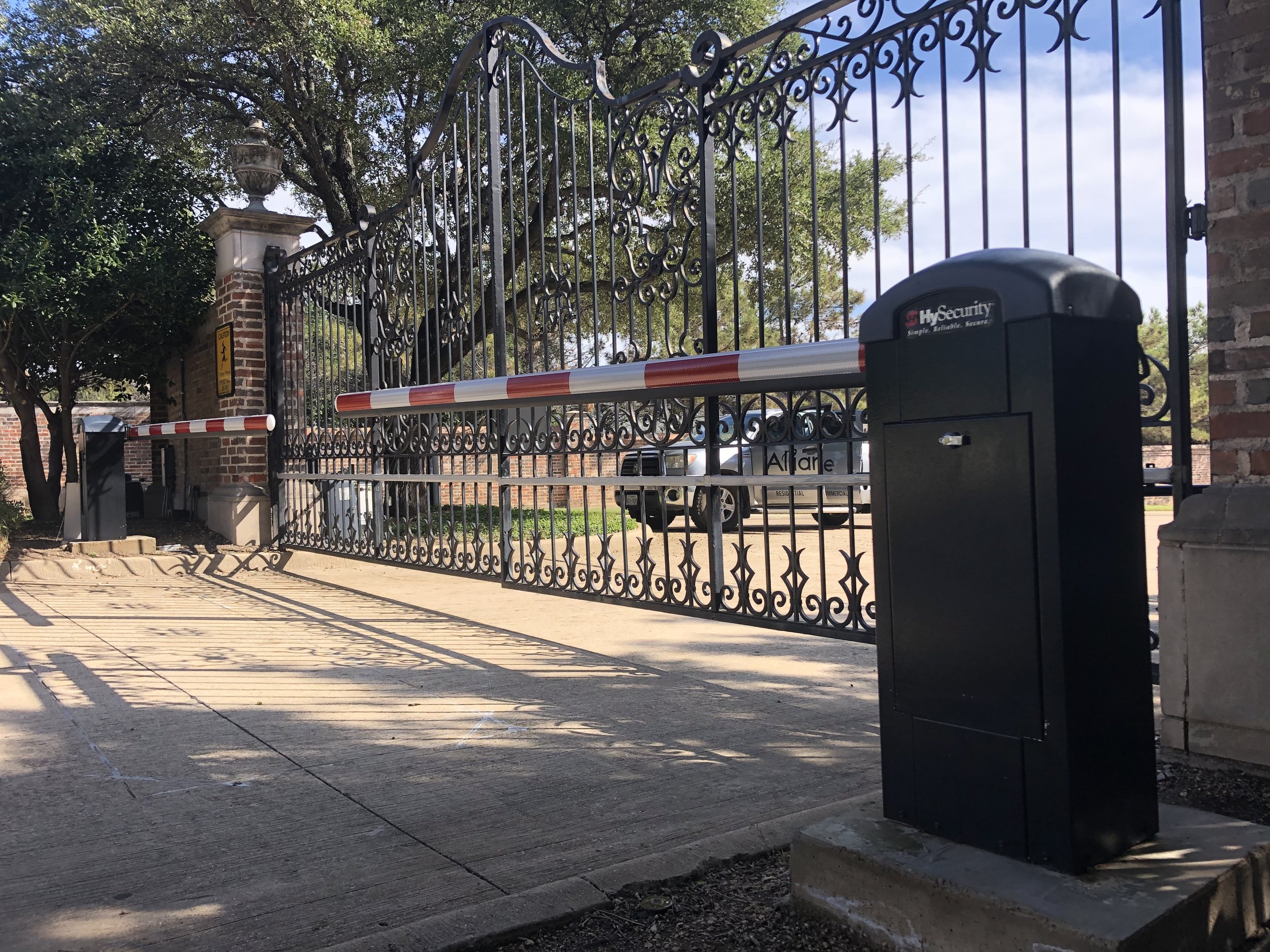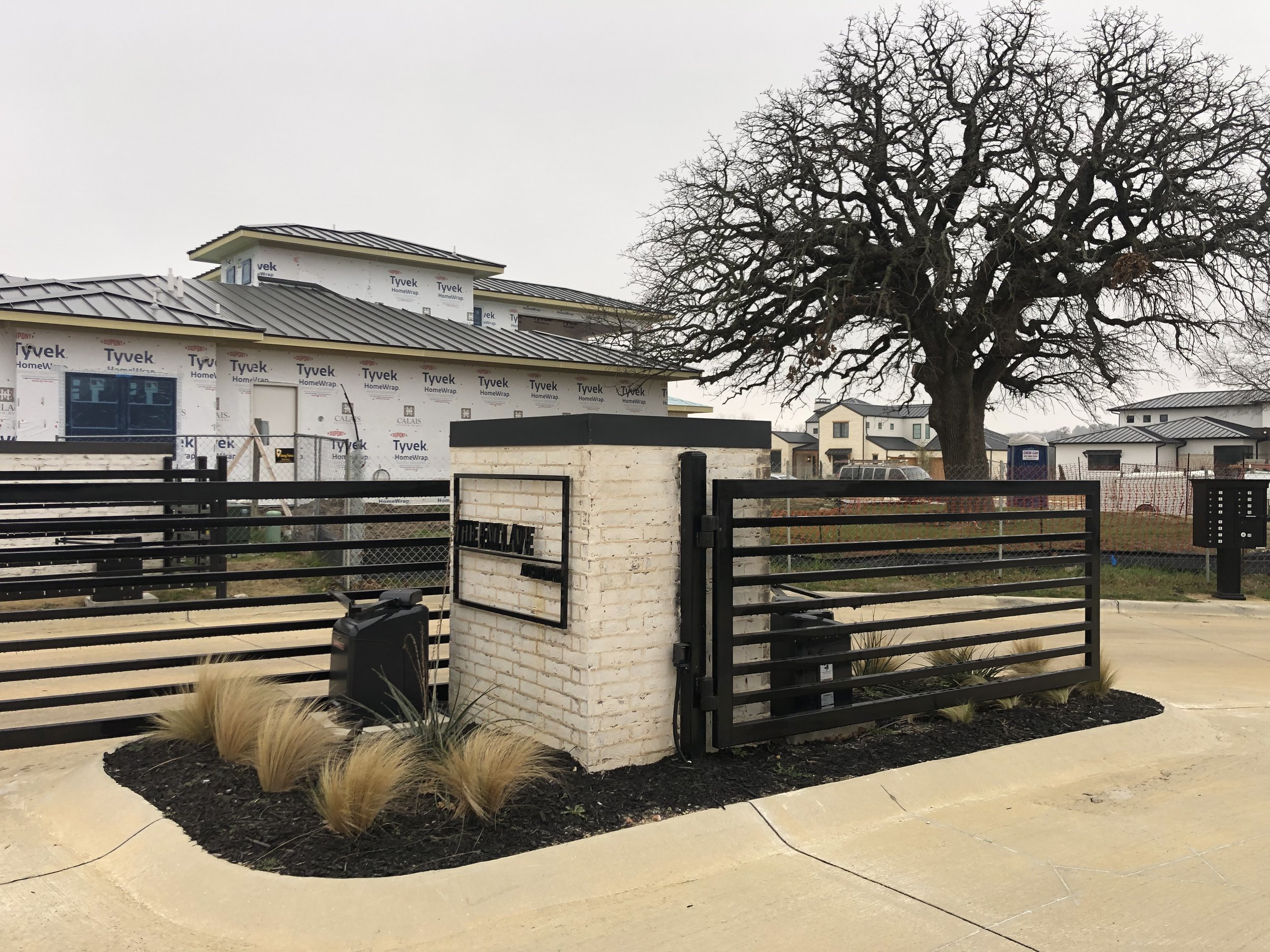
Access Systems
The access system of your gate is what allows your gate to open and close on demand.
An access management system is a vital security solution designed to regulate and control entry to a physical space, such as buildings, rooms, or gated areas. This system is used to manage and monitor who is granted access and ensures only authorized individuals or vehicles can enter or exit. In the case of gate entry systems, access control is implemented at gates or entrances, playing a crucial role in securing properties. These systems typically incorporate a mix of hardware and software, such as keypads, card readers, biometric readers, intercoms, and cameras, providing a secure and efficient way to control access. A security gate system can be programmed to restrict entry to only approved personnel or vehicles, with features that log all entries and exits for monitoring and record-keeping purposes. Gate access control is an integral part of a comprehensive security solution for properties with gated entrances, offering enhanced control over who can access the premises, alongside convenience and peace of mind.
Why Do I Need an Access System
A gate access control system offers homeowners a secure and convenient way to manage entry to their property. With this system, homeowners can control who accesses their property, ensuring that only authorized personnel or vehicles are granted entry. Modern access control systems even allow homeowners to operate and monitor their automated gate remotely via their smartphone or computer, providing remote access whether they are home or away. These systems also keep a detailed log of all entries and exits, enabling homeowners to track who is coming and going. Additionally, with a security gate system in place, homeowners can eliminate the need for manual operation, as automatic gate openers handle entry and exit, making the process far more convenient.
Access control systems offer a range of advantages for businesses, such as improved security, increased operational efficiency, and support for compliance. By regulating who enters the property and closely monitoring access, these systems create a more secure environment for businesses. Additionally, gate entry systems can restrict access to specific areas of the property, ensuring that only authorized personnel are allowed entry to sensitive zones. These systems can also streamline entry and exit procedures, reducing the time and effort required to manage traffic flow. With features like gate access control panels, businesses can monitor every movement, keeping a detailed log of entries and exits to ensure a complete audit trail for compliance and monitoring purposes.
Access control systems for neighborhoods, gated communities, and municipalities offer enhanced security, improved traffic flow, and ensure compliance with local regulations. By regulating who enters and monitoring gate access control, these systems create a safer environment for residents. Moreover, these systems help streamline traffic flow by managing the entry and exit of vehicles, ensuring smooth operation during peak hours. In emergency situations, gate entry systems can grant emergency responders quick access to gated areas, all while maintaining high-level security for residents.
Getting an Access System
Before investing in a gate access control system, it’s important to assess your specific needs. Start by considering the size of your property and the number of people who require access. Additionally, evaluate any compliance requirements you must meet. Do you need a system that can be managed remotely via a smartphone or computer? Will you need to integrate the access control system with other security solutions, such as security gate systems or surveillance cameras? Once you have a clear understanding of your requirements, you can select the right type of gate entry system.
There are several options available, including keypad systems, card readers, biometric systems, and more. Each has its strengths and weaknesses, so it’s essential to choose the system that aligns with your needs and budget.
Proper installation and ongoing gate maintenance are critical to ensuring your access control system functions effectively and efficiently. It's important to understand both the setup process and any long-term gate servicing or gate inspection requirements. Some providers offer comprehensive installation, gate repair, and automatic gate maintenance services, while others may require hiring a third-party contractor. Be sure to account for these expenses—including potential preventative gate maintenance and lubrication service—when budgeting for your gate access control system.
Once your gate access control system is installed, it's essential to ensure that all users receive proper training and education on how to operate the system. This helps guarantee that the access management process is both effective and secure. Whether you're using a keypad, card reader, biometric system, or a security gate system with a swing gate opener, sliding gate opener, or turnstile gate, every authorized user should understand how to interact with the equipment correctly. Some providers may offer user training as part of their service, while in other cases, you may need to organize internal training. Either way, it’s important that everyone who requires entry control is fully trained to ensure smooth and secure operation.
Access control systems, including those used for gate access control, are subject to specific safety regulations designed to protect both individuals and property. These regulations can vary based on the type of security gate system—whether it's a swing gate opener, sliding gate opener, barrier arm gate, or turnstile gate—and the jurisdiction in which the system is installed. Ensuring compliance with these standards is essential for safe and legal operation of your entry control system.
For example, in the United States, the Occupational Safety and Health Administration (OSHA) has established safety regulations that apply to workplace environments, including the use of access control systems. These regulations may require employers to ensure their gate access control systems are properly installed, maintained, and used to help prevent workplace injuries and accidents. Additionally, some jurisdictions mandate that specific types of security gate systems meet established safety standards.
For instance, gate operators—such as swing gate openers, sliding gate openers, and barrier arm gates used in residential and commercial settings—are subject to standards set by Underwriters Laboratories (UL). These UL standards are designed to ensure that automated gates are safe to operate and meet minimum safety requirements for protecting both people and property.
An Alliance Garage and Gates technician is all you need to ensure that all of these factors are taken into consideration. They’ll go over all of the information you’ll require from an access system and ensure that everything’s done right and done according to the regulations of your locality.

Choosing A Brand
There are many different access control products and brands available on the market, each with their own capabilities and features. Here are a few examples:
LiftMaster is a leading manufacturer of gate operators and access control systems for residential and commercial applications. They offer a wide range of products, including sliding gate operators, swing gate operators, and barrier gate operators. Their systems are known for their durability and reliability, and they offer advanced features like smartphone integration and wireless connectivity.
Cellgate is a leading provider of wireless cellular access control systems for residential and commercial applications. Their systems use cellular networks to provide secure and reliable access control without the need for landlines or internet connections. This allows property owners or managers to grant access to authorized individuals from anywhere, using a mobile app or web portal. They also offer advanced features like video surveillance integration and activity logs to help property owners monitor and control access.
One of the key features of Elika Access Systems is their use of advanced technologies, like biometric authentication and facial recognition, to provide secure and convenient access. They also offer a range of connectivity options, including cellular, Wi-Fi, and Ethernet, to ensure that their systems are always connected and accessible. Their systems can be configured to include features like visitor management, time-based access controls, and automatic notifications to property owners or managers.
Access Control & Entry Products
Installation Access System
The installation process for a gate access control system can vary depending on the type of system—such as a swing gate opener, sliding gate opener, or barrier arm gate—and the specific property. However, there are several key steps common to most installations. First, a technician will assess the property to determine optimal placement for access control components like the keypad, intercom, access control panel, or electric gate opener. They will also evaluate available connectivity options—such as Wi-Fi or cellular—to ensure reliable system communication.
If the property already has an existing security gate system, the installation may involve upgrading or replacing certain hardware or software components, which could include running new wiring, updating the access management software, or installing new gate entry system devices. In cases where the property has no previous system, installation may be more extensive, requiring full setup of wiring, component installation, and system configuration tailored to the property's needs.
Whether it's a new installation or an upgrade, it's critical to work with a qualified technician experienced in automated gate systems to ensure the installation is performed properly and meets both functional and safety standards.
Maintenance and Repair
Like any other piece of equipment, access control systems require regular maintenance and occasional repairs to ensure that they are working properly and providing the desired level of security.
Regular maintenance is important for ensuring that your access control system is functioning properly and providing the desired level of security. Maintenance can involve tasks such as cleaning and inspecting components, testing system functionality, and updating software. Many access control system providers offer regular maintenance services as part of their service offerings.
If your access control system is not functioning properly or has been damaged, it may need to be repaired. Repairs can involve tasks such as replacing damaged components, fixing wiring issues, or updating software. If your system is under warranty, repairs may be covered by the warranty. If not, repairs can be costly, so it's important to work with a reputable service provider who can diagnose the issue and provide an accurate estimate for repair costs.
Alliance Garage and Gates is your one stop shop for access systems, their installation, and their maintenance. Get in touch with us today to get your new access system today.








